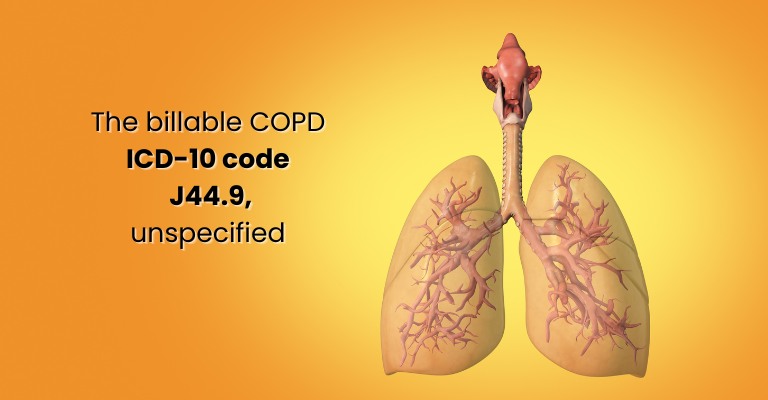As a healthcare provider, you may find challenges when dealing with a chest pain patient. Now, tackling the appropriate ICD-10 code for COPD is crucial for healthcare providers to ensure proper diagnosis, treatment, and billing. Explore the complex coding systems, because only medical expertise is not required for this commonly discussed disease.
It’s time to talk and understand the COPD ICD-10 code and demolish the complexities regarding ICD-10 coding. As a healthcare provider, you must have to unlock the secret door for proper diagnosis and betterment for reimbursement.
What are COPD and accurate ICD-10 codes for COPD?
Chronic Obstructive Pulmonary Disease is a long-term lung disease that makes it hard to breathe. COPD blocks airflow in the lungs, making walking or cooking difficult. COPD is primarily caused by smoking, although exposure to air pollution, chemicals, and genetic factors.
It develops over time and becomes a serious condition. It affects millions of people worldwide. It can be caused by a few common symptoms, including coughing, wheezing, shortness of breath, chest tightness, and fatigue.
People suffering from COPD must visit a healthcare provider because if left untreated, it can lead to serious complications, such as respiratory failure, heart problems, and even death. Therefore, it is important to seek medical attention.
Accurate COPD ICD-10 code?
For appropriate diagnosis of each disease, the ICD-10 coding system provided codes. As a healthcare provider, it is crucial to understand these ICD-10 for proper treatment of patients and billing. According to the 10th edition of the ICD-10 coding system, the billable COPD ICD-10 code is J44.9.
The Impact of J44.9 on Mental and Physical Health
COPD ICD-10 code J44.9 disturbs the entire life of a person. J44.9 impacts mental and physical health as well. Proper diagnosis of COPD is essential so that the person can live a better life.
Mental Health Impacted by J44.9:
- Anxiety: The breathing difficulties can lead to feelings of anxiety, as individuals may worry about their next breath or experience panic attacks.
- Depression: The chronic nature of COPD and its limitations on daily activities can lead to depression due to reduced quality of life and social isolation.
- Stress: Managing the symptoms of COPD, along with its impact on lifestyle and the need for ongoing treatment, can cause significant stress.
Physical Health Impacted by J44.9:
- Reduced Lung Function: COPD leads to a decrease in lung function, making it hard to breathe, especially during physical activities.
- Frequent Respiratory Infections: People with COPD easily catch colds and the flu, which can make their lung problems worse.
- Fatigue: Due to decreased oxygen levels and the effort required to breathe, people with COPD often experience chronic fatigue, impacting their ability to perform daily tasks.
How J44.9 Diagnosis Code Affects Lung Function
The J44.9 diagnosis code, also known as the ICD 10 code J44.9, indicates a condition called Chronic Obstructive Pulmonary Disease or COPD. This code is used by healthcare professionals to identify patients with COPD.
When someone has this code on their medical record, it means they have trouble breathing because their airways are blocked or damaged. Over time, this can get worse, making everyday activities hard to do. The J44.9 diagnosis code is important for doctors to know so they can give the right treatment to help manage symptoms and slow down the disease.
The ICD-10 code J44.9 also helps in tracking the health and progress of someone with lung problems. It ensures they get the support they need. Overall, the J44.9 diagnosis code is key in identifying and treating lung issues to improve a person’s quality of life.
Coding Guidelines for COPD ICD-10 Code J44.9
- ICD-10 code j44.0 is used to document COPD with chronic bronchitis, emphysema, or asthma. So, you can use a combined code when documenting COPD.
- If a patient with acute exacerbations of COPD, use the codes from category J44.1.
- If the patient has both asthma and COPD, report a separate code for each condition.
- Use additional codes to document any comorbid conditions or complications, such as hypertension, heart failure, or pneumonia.
- If a patient is suffering from any other conditions such as hypertension, heart failure, or pneumonia. In this case, use additional codes to document.
- Document the severity of the COPD using codes from category J44.9.
- Report the appropriate external cause code for COPD if it is caused by exposure to tobacco smoke, environmental pollutants, or other external factors.
How external factors impact ICD-10 code COPD J44.9
External factors play a significant role in the coding of COPD ICD-10 code J44.9. When a patient’s COPD is linked to external influences like tobacco smoke, or environmental pollutants. it’s crucial to include an external cause code alongside the primary ICD-10 code for COPD.
This ensures a comprehensive understanding of the patient’s condition. It highlights the specific cause. These practices enhance the accuracy of medical coding and assist in modifying patient care and treatment plans.
It enriches the dataset for medical research and plays a pivotal role in public health initiatives. They aimed at addressing the root causes of COPD. Moreover, for insurance and reimbursement processes, detailing the external cause of COPD can be a requirement.
Tobacco Use
Tobacco smoke is the most significant risk factor for developing COPD, coded as J44.9 in the ICD-10 classification. When individuals inhale tobacco smoke, the harmful substances activate chronic inflammation in the lungs. It leads to the destruction of lung tissue and blocks airflow.
Over time, repeated exposure exacerbates lung damage, enhancing the severity of COPD symptoms such as persistent cough, mucus production, and breathing difficulties. The clear connection between using tobacco and getting worse COPD shows how important it is to stop smoking. This can help to stop the start or get worse of the disease, COPD ICD-10 code J44.9.
Environmental Pollutants
Environmental pollutants, including air pollution, occupational dust, and chemicals, also play a crucial role in the development and exacerbation of COPD ICD-10 code J44.9. These pollutants can cause and increase chronic inflammation in the respiratory tract. It leads to decreased lung function and the progression of COPD.
Long-term exposure to such pollutants, especially in industrial and urban settings, significantly increases the risk of developing COPD. This highlights the importance of environmental health measures and workplace safety regulations in reducing the burden of COPD associated with code J44.9.
Different ICD-10 Codes for COPD
| Code description | ICD-10 code |
| COPD with Chronic Bronchitis | J44.0 |
| COPD with Acute Exacerbation | J44.1 |
| Emphysema | J43 |
| Panlobular Emphysema | J43.1 |
| Centrilobular Emphysema | J43.2 |
| Other Emphysema | J43.8 |
| Emphysema, Unspecified | J43.9 |
| Asthma | J45 |
| Mild intermittent Asthma | J45.2 |
| Mild Persistent Asthma | J45.3 |
| Severe Persistent Asthma | J45.5 |
| Other And Unspecified Asthma | J45.9 |
| COPD with (Acute) Exacerbation, Unspecified | j44.9 |
| Moderate Persistent Asthma | J45.4 |
What are the causes of rejection of COPD ICD-10 code J44.9
- Inaccurate Documentation: If the medical records do not contain sufficient details about the patient’s condition, diagnosis, and treatment, it can lead to the rejection of the COPD code J44.9. Accurate and comprehensive documentation is crucial for coding and billing purposes.
- Lack of Specificity: The ICD-10 code J44.9 is a general code for COPD without exacerbation. If the patient’s medical condition was more specific. For example, in COPD with acute exacerbation or with chronic bronchitis, if the more specific code was not used, the claim might be rejected. Using the most specific code available is essential for accurate billing.
- Coding Errors: Errors in typing or using old codes can cause claims to be denied. It’s important to use the right ICD-10 code and put it in the billing system correctly. Getting updates and learning more about ICD-10 codes can help avoid these mistakes.
Conclusion
Overall, it is essential to understand and accurately use the ICD-10 code for COPD. As a healthcare provider, it is our responsibility to provide accurate diagnosis and treatment according to the patient’s needs. Healthcare providers need to possess knowledge and expertise to manage serious conditions. Understanding the coding guidelines of COPD ICD-10 code J44.9, so that you can provide high-quality life to your patients. Stay up-to-date on the latest developments in COPD coding.





